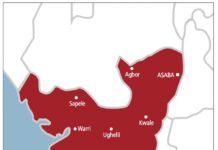An Afghan woman was stabbed in both eyes and shot because she got a job, and cops say her father was one of the people involved in the gruesome act.
33-year-old Khatera had been a police officer in Ghazni province for only three months when the attack occurred.

The last thing the victim saw were the three men on a motorcycle who attacked her immediabtely she left the police station in Afghanistan’s central Ghazni province, stabbing her with a knife in both eyes and shooting her.
Khatera and local police blame the attack on Taliban militants, who have denied any involvement, and say the culprits acted on a message from her own dad who strongly did not want her working outside the home.
The 33-year-old revealed that the incident caused not just the loss of her eyesight but the loss of a dream she had struggled to bring to fruition, to have an independent career.
“I asked the doctors, why I can’t see anything? They told me that my eyes are still bandaged because of the wounds. But at that moment, I knew my eyes had been taken from me,” Khatera said, recalling the moment she woke up in hospital.
Shehad joined the Ghazni police as an officer in its crime branch only three months earlier.
“I wish I had served in police at least a year. If this had happened to me after that, it would have been less painful. It happened too soon… I only got to work and live my dream for three months,” she told Reuters.
This incidence reveals a growing trend of an intense and many times violent opposition against women taking jobs, especially in public roles according to human rights activists.
Human rights activists report that a brazen Taliban gaining influence, the Afghanistan’s conservative social norms and the United States withdraws its troops from the country is increasign violence in the country.
The Taliban are presently negotiating in Doha, Qatar, with the Afghanistan government to secure a peace deal in which many expect the froup to formally return to power, however, progress is not fast and there has been increased attacks on officials and notable women around the country as well as fighting.
In recent times, the Taliban group have said they will respect women’s rights under Sharia law but many educated women say they have suspicions.
The group are agaisnt a reform to add mother’s names to identity cards, one of the very first demands they have revealed on women’s rights as they try and reach a peace process.
“Though the situation for Afghan women in public roles has always been perilous, the recent spike in violence across the country has made matters even worse,” said Samira Hamidi, Amnesty International’s Afghanistan campaigner. “The great strides made on women’s rights in Afghanistan over more than a decade must not become a casualty of any peace deal with the Taliban.”
Khatera’s wish since she was a child was to work outside the home and after years of trying to persuade her father, who didn’t listen to her, she was able to gain support from her husband.
“Many times, as I went to duty, I saw my father following me… he started contacting the Taliban in the nearby area and asked them to prevent me from going to my job,” she said.
Khatera revealed that her father gave the Taliban a copy of her ID card to prove she worked for the police and that he had called her throughout the day she was attacked, asking her for her location.
Ghazni’s police spokesman confirmed they believed the Taliban were involved in the attack on Khatera and that her father had been taken into custody.
Reuters have been unable to speak to him directly for comment.
A Taliban spokesman revealed that the group was aware of the incidence and also said that it was a family affair and denied involvement.
The victim and her family, including five children, are currently taking shelter in Kabul, where she is recovering and grieving the career she lost.
Khatera is having troubles sleeping, jumps whenever she hears a motorbike and on longer contacts her extended family, including her mother, who blames her for her father’s arrest.
She is optimistic that a doctor abroad can partially restore her vision.
“If it is possible, I get back my eyesight, I will resume my job and serve in the police again,” she said, adding in part she needed an income to avoid destitution. “But the main reason is my passion to do a job outside the home.”










